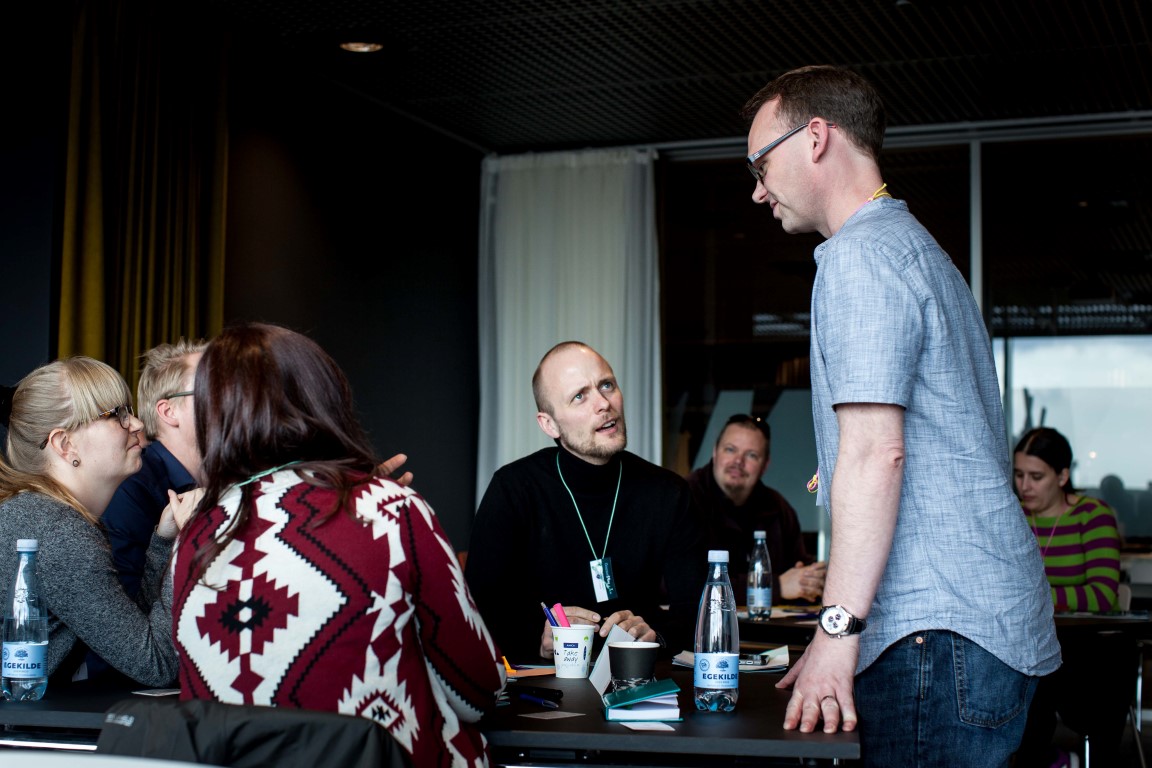[et_pb_section admin_label=”section”][et_pb_row admin_label=”row”][et_pb_column type=”4_4″][et_pb_text admin_label=”Text” background_layout=”light” text_orientation=”left” use_border_color=”off” border_color=”#ffffff” border_style=”solid”]
[Image text: Alex is a friendly guy, but what if he was not? How could this pose be a demonstration of power?]
The theme for CounterPlay ’17 is “The Power of Play“, and I urge you to not solely understand it in the “usual” sense. I believe the phrase is commonly used to point towards, well, “the power of play”, the way play is powerful and holds transformative potential in a wide range of situations throughout our lives.
I obviously agree that play is massively powerful, and I think this is, in part, due to the participatory nature of play, which again means play is powerful because it invites us to play with power:
This is to say that if there is not a shift of power, if those expected to participate are not powerful (to a never precisely defined extent), “at some point participation simply stops being participation”. Participation, then, should not be used as a glossy term to hide the fact that often, there is no real power for the socalled participants. Exactly the same can be said about play and playfulness. Do you want to cultivate a playful culture in the workplace? Well, it can’t be sugarcoating (like ping-pong tables or other gimmicks), it needs to be embedded in the fabric, and it requires actual power and decision making to be put in the hands of those you expect to play along.
I reiterated this in my discussion of “playwashing“:
play is only real if it entails real participation and participation is only real if it entails a redistribution of power among the participants. Consequently, an organization is not playful if there is not a connection between the proclaimed presence of play in the organization and the distribution of power.
Do the opportunities to play (if they are at all there) come with real agency and influence? Are employees frequently engaging in negotiations of rules and purpose of the work they’re doing? Is there a real sense of ownership and a shared responsibility?
[/et_pb_text][et_pb_image admin_label=”Image” src=”http://www.counterplay.org/wp-content/uploads/2017/01/IMG_2386-Medium.jpg” show_in_lightbox=”off” url_new_window=”off” use_overlay=”off” animation=”left” sticky=”off” align=”left” force_fullwidth=”off” always_center_on_mobile=”on” use_border_color=”off” border_color=”#ffffff” border_style=”solid” /][et_pb_text admin_label=”Text” background_layout=”light” text_orientation=”left” use_border_color=”off” border_color=”#ffffff” border_style=”solid”]
This way of framing or understanding play, as inherently participatory, subversive, rebellious even, is rapidly becoming more important as politicians all around the world are increasingly ignoring or downright limiting our opportunities for civic participation and, eventually, our freedom. As Bernie DeKoven has told us time and again, “play is freedom” and games are metaphors that allow us to “imagine freedom“. Clay Mazing shows it. Miguel Sicart writes about it:
Play is like language— a way of being in the world, of making sense of it. It takes place in a context as a balance between creation and destruction, between adherence to a structure and the pleasures of destruction. Playing is freedom.
Playfulness frees us from the dictates of purpose through the carnivalesque inheritance of play. Through playful appropriation, we bring freedom to a context.
Thomas S. Henricks touch upon similar perspectives:
If play has a central quality, it is that this behavior (as action, interaction, and activity), first of all, celebrates people’s abilities to craft their own responses to circumstances free from interference. That distinctive process of making and interpreting, what I have called ascending meaning, is connected intimately to the project of human freedom.
I’m convinced that playful people are better equipped to play with power, to challenge power, and to insist on freedom, but I also believe we need to explore this in more breadth and depth. Following our logic of cross-pollination and deploying a kaleidoscopic view on play is what leads me to the “invitation” part of this (already too long) post:
Let’s collect and share bits and pieces that demonstrate the power of play to play with power.
I’m thinking we could do a series of blog posts right here, but as always, I’m open to any suggestion that will make us, as a community, more knowledgeable on the power of play. Who knows, maybe it can lead to real, powerful and playful activism?
Do you want to play along? Will you share your experiences, insights and ideas?
[/et_pb_text][/et_pb_column][/et_pb_row][/et_pb_section]

Leave a Reply